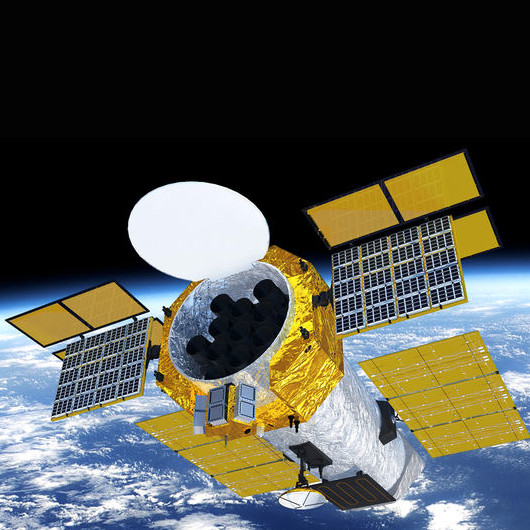IEEC researchers at the heart of new space mission to study the state of matter under extreme conditions

A new space mission, called eXTP (Enhanced X-ray Timing and Polarimetry Mission), will have at its core Spanish astronomers. The mission, designed to study fundamental physics topics such as what is happening on the vicinity of black holes or what is the state of matter inside neutron stars, is a collaboration between several European countries and China.
The eXTP X-ray satellite (enhanced X-ray Timing and Polarimetry Mission) is envisioned to be launched in 2027, with four instruments onboard. One of them, the Wide Field Monitor (WFM), will have Margarida Hernanz, a researcher from the Institute of Space Studies of Catalonia (IEEC — Institut d’Estudis Espacials de Catalunya) at the Institute of Space Sciences (ICE, CSIC), as its principal investigator. The ICE-CSIC group will also be responsible for the mechanical and thermal design of the WFM instrument, and the development of the entire mechanical assembly of its cameras.
The mission’s plan is to study the state of matter under extreme conditions of density, gravity and magnetism. The main goals are the determination of the equation of state of matter at very large densities, probing the theory of gravity in extreme environments, as well as the study of the behavior of light in the presence of ultra-strong magnetized stars. With these aims, the primary targets are isolated and binary neutron stars, stellar-mass and supermassive black holes and magnetars – neutron stars with gigantic magnetic fields – respectively.
Several scientists of IEEC (ICE-CSIC) are involved in the scientific design of the eXTP X-ray satellite: in particular, Nanda Rea, Laura Tolos, Diego Torres, Francesco Coti Zelati and Alessandro Patruno have been working for several years in the scientific shaping of the instrument for neutron star studies. The technical challenges about the design of the WFM instrument are the responsibility of engineers from IEEC (ICE-CSIC), in particular José Luis Gálvez, Lluís Gesa, Mikel Lamensans and Eduard Mirabet.
Researcher Margarita Hernanz says: "Being the PI of the WFM for eXTP is a challenging and exciting task, both from the scientific and technological point of view, done in close collaboration with the most expert teams in the field of X-ray astronomy in the world. It will allow the scientific community to get access to an incredible wealth of data, crucial for solving problems within fundamental physics and astrophysics."
The WFM instrument will be composed of a set of 3 pairs of coded mask cameras, equipped with silicon detectors, covering a wide field of view. Its mission will be to scan the sky in search of rare events for which it will then be able to emit triggers, so that the other instruments onboard the satellite, that have a narrower field of view, can make more precise observations.
The idea of this mission stems from a former European Space Agency (ESA) mission proposal, called LOFT (Large Observatory For X-ray Timing). The feasibility study, funded by ESA, was completed in 2013 with an excellent evaluation. Even though LOFT was not selected for launch, the idea was continued by a collaboration between China, Italy, Spain, Germany, Denmark, France, Netherlands, Poland, Czech Republic and Switzerland, who are now actively participating in the development of eXTP.
On the 21 and 22 January 2020, ICE-CSIC is hosting a workshop dedicated to the scientific and technical advances in the development of the eXTP mission. The objective of the meeting is to publicize the science and possibilities that eXTP will offer to the Spanish astronomical community, as the large involvement of Spain in this mission will provide unique opportunities for research. The meeting is organised and funded by the Spanish Red de Infraestructuras de Astronomía (RIA) and ICE-CSIC.
Links
– IEEC
– ICE – CSIC
– RIA
– eXTP
– LOFT – ESA
More information
The Institute of Space Studies of Catalonia (IEEC — Institut d’Estudis Espacials de Catalunya) promotes and coordinates space research and technology development in Catalonia for the benefit of society. IEEC fosters collaborations both locally and worldwide and is an efficient agent of knowledge, innovation and technology transfer. As a result of over 20 years of high-quality research, done in collaboration with major international organisations, IEEC ranks among the best international research centers, focusing on areas such as: astrophysics, cosmology, planetary science, and Earth Observation. IEEC’s engineering division develops instrumentation for ground- and space-based projects, and has extensive experience in working with private or public organisations from the aerospace and other innovation sectors.
IEEC is a private non-profit foundation, governed by a Board of Trustees composed of Generalitat de Catalunya and four other institutions that each have a research unit, which together constitute the core of IEEC R&D activity: the University of Barcelona (UB) with the research unit ICCUB — Institute of Cosmos Sciences; the Autonomous University of Barcelona (UAB) with the research unit CERES — Center of Space Studies and Research; the Polytechnic University of Catalonia (UPC) with the research unit CTE — Research Group in Space Sciences and Technologies; the Spanish Research Council (CSIC) with the research unit ICE — Institute of Space Sciences. IEEC is integrated in the CERCA network (Centres de Recerca de Catalunya).
Images
PR_Image1: X-ray Timing and Polarimetry mission (eXTP)
Caption: The enhanced X-ray Timing and Polarimetry mission (eXTP) is a science mission designed to study the state of matter under extreme conditions of density, gravity and magnetism.
Credit: eXTP Consortium
Contacts
IEEC Public Information Office
Barcelona, Spain
Rosa Rodríguez Gasén
E-mail: comunicacio@ieec.cat
Lead Scientist at IEEC
Institute of Space Science (ICE-CSIC)
Barcelona, Spain
Margarida Hernanz
Researcher
E-mail: hernanz@ieec.cat, hernanz@ice.csic.es
